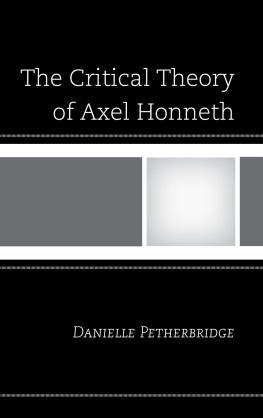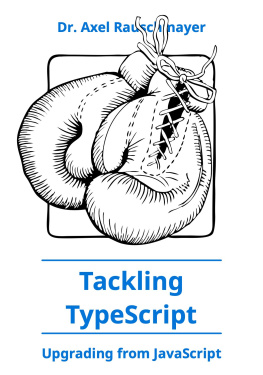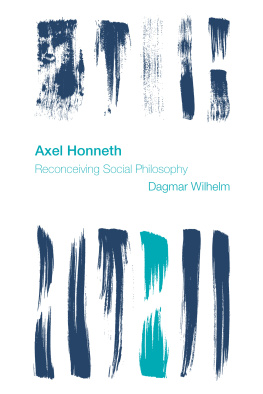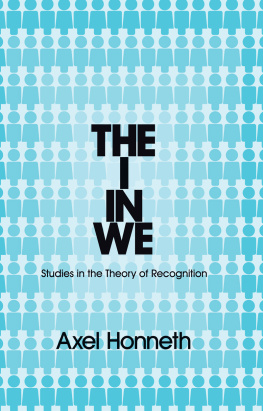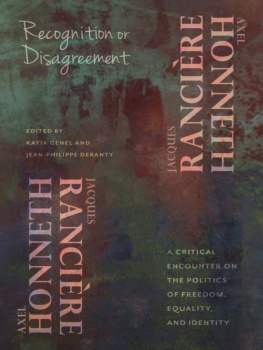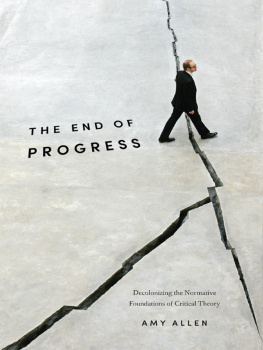Honneth Axel - The Critical Theory of Axel Honneth
Here you can read online Honneth Axel - The Critical Theory of Axel Honneth full text of the book (entire story) in english for free. Download pdf and epub, get meaning, cover and reviews about this ebook. City: New York;Boulder;Lanham, year: 2013;2012, publisher: Lexington Books, genre: Science. Description of the work, (preface) as well as reviews are available. Best literature library LitArk.com created for fans of good reading and offers a wide selection of genres:
Romance novel
Science fiction
Adventure
Detective
Science
History
Home and family
Prose
Art
Politics
Computer
Non-fiction
Religion
Business
Children
Humor
Choose a favorite category and find really read worthwhile books. Enjoy immersion in the world of imagination, feel the emotions of the characters or learn something new for yourself, make an fascinating discovery.
- Book:The Critical Theory of Axel Honneth
- Author:
- Publisher:Lexington Books
- Genre:
- Year:2013;2012
- City:New York;Boulder;Lanham
- Rating:4 / 5
- Favourites:Add to favourites
- Your mark:
- 80
- 1
- 2
- 3
- 4
- 5
The Critical Theory of Axel Honneth: summary, description and annotation
We offer to read an annotation, description, summary or preface (depends on what the author of the book "The Critical Theory of Axel Honneth" wrote himself). If you haven't found the necessary information about the book — write in the comments, we will try to find it.
The Critical Theory of Axel Honneth — read online for free the complete book (whole text) full work
Below is the text of the book, divided by pages. System saving the place of the last page read, allows you to conveniently read the book "The Critical Theory of Axel Honneth" online for free, without having to search again every time where you left off. Put a bookmark, and you can go to the page where you finished reading at any time.
Font size:
Interval:
Bookmark:
The Critical Theory of Axel Honneth
The Critical Theory of Axel Honneth
Danielle Petherbridge
LEXINGTON BOOKS
Lanham Boulder New York Toronto Plymouth, UK
Published by Lexington Books
A wholly owned subsidiary of The Rowman & Littlefield Publishing Group, Inc.
4501 Forbes Boulevard, Suite 200, Lanham, Maryland 20706
www.rowman.com
10 Thornbury Road, Plymouth PL6 7PP, United Kingdom
Copyright 2013 by Lexington Books
All rights reserved. No part of this book may be reproduced in any form or by any electronic or mechanical means, including information storage and retrieval systems, without written permission from the publisher, except by a reviewer who may quote passages in a review.
British Library Cataloguing in Publication Information Available
Library of Congress Cataloging-in-Publication Data
Library of Congress Cataloging-in-Publication Data Available
ISBN 978-0-7391-7203-2 (cloth : alk. paper) -- ISBN 978-0-7391-7204-9 (electronic)
 TM The paper used in this publication meets the minimum requirements of American National Standard for Information Sciences Permanence of Paper for Printed Library Materials, ANSI/NISO Z39.48-1992.
TM The paper used in this publication meets the minimum requirements of American National Standard for Information Sciences Permanence of Paper for Printed Library Materials, ANSI/NISO Z39.48-1992.
Printed in the United States of America
This book was completed with the institutional support of the Irish Research Council and University College Dublin. I would particularly like to express my gratitude to the Irish Research Council for awarding me a postdoctoral research fellowship which enabled the completion of the manuscript. I would also like to thank the anonymous reviewers from Lexington Books for constructive criticism on an earlier draft of the book and Polity Press for kind permission to publish extracts from Axel Honneths, The Struggle for Recognition, Polity Press, 1995.
There are also numerous people I would like to thank for their generous support during the completion of this manuscript. I would especially like to extend my deep gratitude to Maeve Cooke, for her exceptional support and advice throughout the various stages of the work. A special thanks also to Brian OConnor and Amy Allen for invaluable advice and for critical comments on an earlier version of the manuscript. Thanks are also due to Dermot Moran for his suggestions in the later stages of the project, and to faculty, staff, and graduate students at University College Dublin, especially postdoctoral fellows and graduates who discursively engaged with some of the ideas in the book.
Most of all, I would like to warmly thank my family and friends, particularly my parents Maureen and Geoff for their constancy and encouragement. By far the most significant expression of gratitude is dedicated to John, for his love and companionship throughout the life of this work and beyond, and for bringing new meaning to Hegels insight that love is indeed a miracle, that we cannot grasp. It is with the greatest thanks that I dedicate this book to him.
From the beginning, Axel Honneths project has been directed towards the key problem of reconstructing a conceptual framework that can both comprehend the structures of social domination and identify the resources for its practical transformation. In this respect, Honneth has made a profound contribution to Critical Theory, most notably in terms of defending a normative, emancipatory project and developing a comprehensive theory of recognition that can provide a framework for analyzing the distorting effects of modern social conditions on subjective experience and subject-formation.
As the leading theorist of the third generation of the Frankfurt School, Honneth has productively renewed the project of Critical Theory in ways that both continue and differentiate his own project from first and second generations. As Jrgen Habermas successor in social philosophy at the University of Frankfurt and Director of the Institute for Social Research, Honneth has been instrumental in extending the Institutes interdisciplinary research programs, most notably around the research themes of the structural transformation of recognition and paradoxes of capitalist modernization. Although not formally a student of Habermas, Honneth was appointed as an assistant professor in Habermas research group in the 1980s, and after holding positions in Berlin and Konstanz, was appointed to Habermas chair in Frankfurt in 1996. However, while Honneth is undeniably committed to the mode of social critique originally derived from the first generation of the Frankfurt School, he also fully endorses the communicative transformation of Critical Theory first initiated by Habermas. In this sense, much of Honneths work has been dedicated to developing an alternative intersubjective basis for Critical Theory that can safeguard its normative intent and he shares Habermas basic intuition that such norms can be found as current practices or experiences within our social lifeworlds.
While Honneth has engaged with many of the same theoretical resources as Habermas, from historical materialism, philosophical anthropology, psychoanalysis, developmental psychology, American pragmatism, and German Idealism, he has also sought to make them his own and has undertaken a form of reconstructive criticism that has resulted in remarkably new and productive outcomes. Honneths alternative readings of Hegel, Feuerbach, Marx, Lukcs, and Mead have produced not only an alternative theory of intersubjectivity but also a theory of recognition alert to subjective experiences of social suffering, fragmentation, and alienation. One of the hallmarks of Honneths work has also been his preparedness to engage productively with a range of alternative positions in both contemporary French philosophy and phenomenology, including the work of Derrida, Sartre, Merleau-Ponty, Castoriadis, Foucault, and Levinas in developing a multidimensional theory of intersubjectivity and recognition.
However, it is not only his predisposition to an engagement with a range of alternative philosophical traditions and theoretical resources that sets Honneth apart from previous generations of the Frankfurt School, but also his political and social context. Born in 1949 in Essen, Germany, Honneths formative years were more influenced by the social changes and new social movements of the 1960s and 1970s, rather than any direct experience of the years of German National Socialism and wartime atrocities, or the failure of the so-called revolutionary consciousness of the working classes both in the interwar years and in the face of Nazism.
These impulses have become guiding motifs in Honneths work and his theory of recognition is predicated on the idea of a phenomenology of social suffering, those lived experiences of disrespect that provide immanent resources within social life for the basis of social critique and transformation. In this respect, Honneth continues the guiding premise of first and second generations of Critical Theory by developing a critique of philosophical categories which is immanently connected to social diagnoses that identify an often concealed, suppressed, or ignored emancipatory interest or horizon in social reality. Honneths primary focus has indubitably been an examination of the pathologies of individual subject-formation and distorted identity as the basis for social conflict and struggle.
However, the theoretical manner in which Honneth reconceives of both a theory of society and social change, his dedication to a fundamentally action-theoretic stance and re-orientation of the communicative paradigm, his development of a multidimensional theory of intersubjectivity and philosophical anthropology, and his more nuanced analysis of power, clearly sets him apart from members of both first and second generations of Critical Theory.
Next pageFont size:
Interval:
Bookmark:
Similar books «The Critical Theory of Axel Honneth»
Look at similar books to The Critical Theory of Axel Honneth. We have selected literature similar in name and meaning in the hope of providing readers with more options to find new, interesting, not yet read works.
Discussion, reviews of the book The Critical Theory of Axel Honneth and just readers' own opinions. Leave your comments, write what you think about the work, its meaning or the main characters. Specify what exactly you liked and what you didn't like, and why you think so.

